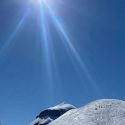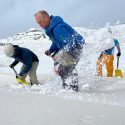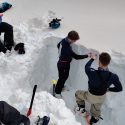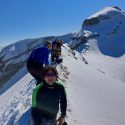Ex COCKNEY WESTMINSTER 22 – Ulysses Trust Report
By Major Steve Higgs REME
Ulysses Trust ID 2840
Exercise COCKNEY WESTMINSTER 22, 11 – 27 March 2022, Flaine, France.
HQ London District
The 2022 winter season drew much attention for those working within Headquarters London District (a hybrid Regular and Volunteer Reserve organisation), having spent the previous two winters heavily committed to providing Defence related activities such as Op RESCRIPT (support to the Covid-19 emergency) in addition to general duties and ceremonial activity, despite the unique challenges posed by the pandemic. By Spring 2022, conditions were such that Headquarters staff could consider the possibility of engaging in some adventurous training.
Ex COCKNEY WESTMINSTER 22 was therefore a long overdue opportunity for the Headquarters to step out of their comfort zones and brave the terrain of Flaine, France. Some 17 Volunteer Reservists and 3 x ski instructors took to the snowy mountains alongside Regular personnel in order to conduct both Ski Foundation 1 (SF1) and Ski Foundation 2 (SF2) alpine training. The group consisted primarily of those relatively new to the sport, with a handful who had never been at all.
The exercise started out strong with a convoy of minibuses leaving London heading towards the Eurotunnel. Some well-planned rotations of driving duties kept the team on track for the 15-hour long charge across the continent, fuelled by service station coffee and endless madeleines, with only minimal fuss negotiating the ever-changing mask wearing guidance at the local motorway pit stops.
On arrival in Flaine the team were greeted by snow and mountains, as hoped for, in addition to some very welcome fair-weather conditions, which after having spent every day the week prior eagerly researching weather patterns online and praying to the snow gods was entirely unexpected. Accommodated in the UCPA hostel we made ourselves at home and set up camp, quickly familiarising ourselves with the nearest fireplace.
Our first evening and morning consisted of unpacking the myriad of equipment that would be required for the coming weeks. A combination of skis, boots and some alarmingly long metal poles which we would later come to discover were not a form of mystical alpine sword but instead probes to find people buried under the snow. This was proceeded by an hour-long boot fitting session which was our first true test of character. With a few of the more experienced individuals wincing in anticipation of what was to come, it was at this point the group started to become aware of those who were braving their first venture into alpine skiing and indeed the particular delights of ski boots.
The initial days were aimed primarily at getting us onto the slopes, familiarising ourselves with the equipment and the cold substance covering the ground, learning where to stop and how to fall over without collecting the remainder of your ski group on the way down like pins in a game of bowling.
The fair weather sadly did not last, and by the end of only the third day the group were faced with thick cloud cover and precipitation, much to the delight of the instructors who then jumped at the opportunity to begin a series of mountain skills lectures. We carried out a set of purpose planned activities to increase our awareness and understanding of how snow forms on the mountain, and ultimately our ability to survive a harsh mountain environment. These lectures also covered detail such as snowpack formation and avalanche awareness, advanced weather patterns and snow shelter construction.
Learning was the aim and ski touring was the game. The group was exposed to a concept called skinning up, which turned out not to have anything to do with fancy football skills but instead required each member to affix an adhesive backed strip of material to the underside of their skis and commence the arduous activity of uphill skiing. We set about the gruelling task of making our way gradually up the sides of the slopes, in full view of the nearest chair lift, much to the amusement of the nearby holiday goers gracefully passing by overhead. However, on reaching the uppermost section of the mountain the group was then able to continue ascending until we reached a ridgeline that sat above the highest point beyond what you could reach by conventional means. It was here that we really started to enjoy the freedom of ski touring and very much relished our newfound ability to explore the mountain in a whole new way.
The remainder of the time consisted of returning to the slopes and building up the confidence of the group to systematically tackle more advanced routes with gradually steeper inclines and icier conditions underfoot. It was at this point we started to settle in with our surroundings, and if not for only the occasional spectacular double ejection bail out amid a cloud of white powder it could be said that the group were starting to get comfortable with this skiing business.
Whilst the expedition clearly succeeded in achieving the aims of adventurous training, it also had an undeniable secondary benefit in both reinforcing the relationships that had been formed during nearly two years of relentless operational activity and provided a much-needed opportunity to recharge and reflect on our collective experience of the pandemic as reservist soldiers. As Major Hugo Evans, who was mobilised to provide support to the NHS Regional Director for London said, ‘Having worked closely, but remotely, with many of the expedition participants over the course of the pandemic, this exercise was an opportunity to cement these relationships and better understand how well we can work together in a challenging environment.’
As our time in Flaine came to a close, we began to recognise what had been achieved. We had introduced the sport of alpine skiing to those who had previously never had the opportunity to experience it, we managed to convince those recently recovered from long-term injuries to brave hurling themselves down a mountain once again, we witnessed junior soldiers find the courage to lead senior officers around the pistes, and we achieved all of this without a single visit to the hospital, much to the relief of the exercise director.
Without the support of the Ulysses Trust to Ex COCKNEY WESTMINSTER 22 we would not have been able to achieve such an outstanding level of success and for that generosity we are extremely grateful.




